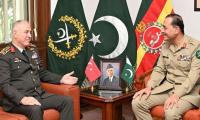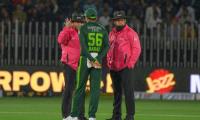ISLAMABAD: How long will the efficacy of the COVID-19 vaccines last is an open question so far. “The safety of these vaccines is evident but their effective life in persons receiving them is yet to be ascertained,” eminent professor Dr Saeed Akhtar told The News, when contacted.
Another specialist Dr Kaleem concurred with this view and said that we would learn with the passage of time whether periodic boosters would be required to keep persons being administered the vaccine safe from the coronavirus in the future.
Dr Saeed Akhtar, who headed the Pakistan Kidney and Liver Transplant Institute & Research Centre (PKLI) that he had set up in Punjab, said it was premature to predict how long the vaccines will remain effective. The best way, he said, is to immediately find out the variant of COVID-19 as a race was going on against the virus.
He said that as the flu virus keeps changing its shape, the strain of COVID-19 has to be constantly monitored to determine any moleculular change that has to be dealt with successfully.
The professor said that in Pakistan the process of administering vaccines should have been started by now. “We should not lag behind other countries of the world in this connection because of the gravity of the disease. Poor and developing countries like ours are in deep trouble because of the epidemic.”
Dr Kaleem said the government should speed up its efforts to obtain a suitable vaccine and should immediately begin administering it to health workers in the first phase and subsequently to the general public. Everybody should get the vaccine easily as everyone is at risk of being infected, he said.
Dr Saeed Akhtar was of the view that with the Almighty’s blessings Pakistan has not been as severely affected even in the second wave of the coronavirus compared to other countries. “As a scientist, I have no answer why this has happened despite the fact that we have not been strictly following the standard operating procedures (SOPs), including wearing masks, using sanitizers, washing of hands etc.”
He said that Pakistan’s young population may be one factor for less infections. But India and Iran too have a large proportion of young people yet they have been badly hit by COVID-19.
The professor said that it was possible that an answer to these questions would be available in the next two to three years when more research is conducted and the new methods are found to take care of the disease.
As far as the government’s handling of the virus is concerned, Dr Saeed Akhtar said it has been somewhat appropriate but a lot more could have been done to change the scenario altogether.
He said he has always been taught that suitable preparations should be done to handle an epidemic when its infection has crossed 50 percent. China did so and controlled Covid-19. Beijing also had the experience of fighting another virus a few years back. The same was the case with the middle eastern countries, that successfully tackled the virus that hit them in 2002. That virus spread from camels, he pointed out.
On the other hand Pakistan, Dr Saeed Akhtar said, has not put together any infrastructure for the purpose. The National Command Operation Centre (NCOC), run by the army, is a temporary measure, that has worked well. But, he said, there is an urgent need to have a permanent institution and, like in the United States, such epidemics should be treated as a national security matter. “We should not wait for another such epidemic to hit us, leaving us bewildered.”
He said clean and reliable data and its collection was most essential in handling any epidemic because without them no timely planning could be done. “We mostly have fabricated data, which hampers us from taking well-timed measures.”
The professor said there was a dire need to have laboratories at the district level, which should have at least one epidemiologist. “In the next five years, data and not the dollar would be the currency. We have to realise that now.”
Dr Saeed Akhtar said that after just two months of its birth, the world started contacting the PKLI to get accurate data as his organisation had developed a foolproof system for the purpose.
Senator Saleem Mandviwala apprised Bilawal of the issues in the Senate
Rabbani said the report of Faizabad Commission chose to close the matter while avoiding further controversy and...
He said political stability is a must for capitalizing on this rare opportunity in the form of Saudi Arabia’s...
At the moment, the foundation is managing 13 model emergency rooms across the country
The report states that due to importation of expensive wheat by government agencies, the national exchequer lost 31.32...
The fashion designer marked her attendance and assured the court that she would appear at each hearing of the case







